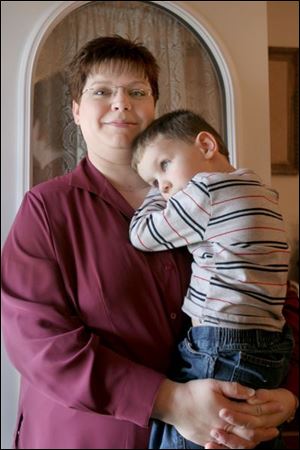
Grieving mom finds recipient for special gift
1/9/2005
Wauseon-area resident Brenda Canada, with her son, Andrew, 4, also is the mother of two daughters who are in their 20s.
Brenda Canada knew her baby probably would not survive but in the midst of her grief decided some good must come from her son's death.
Five months before Christian was to be born, doctors told Mrs. Canada and her husband, Mike, that the child had severe kidney abnormalities and he likely would not live more than a few minutes after birth. The Wauseon-area couple began praying for a miracle but knew the odds were against them.
So Mrs. Canada vowed that the death of her son, who was due to be born Christmas Day, would not prevent her from giving a special gift to someone else's baby.
"We didn't want to live with any regrets," Mrs. Canada said. "We wanted to help other babies."
She had heard about programs in some parts of the country that collect excess breast milk from mothers and distribute it to babies, usually premature infants, whose own mothers cannot provide milk.
After searching on the Internet, she learned the closest program was in Iowa, and she called officials there. Much to her surprise, they told her that a similar program was just getting under way in Ohio.
Mrs. Canada agreed to donate her breast milk to a new collection program based at Grant Medical Center in Columbus after Christian was born, becoming the first mother in Ohio to donate to the nonprofit Mother's Milk Bank of Ohio.
The milk bank has acquired milk from other banks in the country since its formation last year. It expects to install its own pasteurization equipment soon and will begin processing and shipping breast milk from Ohio mothers to any hospital in Ohio that needs it. All milk is pasteurized and tested to ensure safety, according to Georgia Morrow, director of the milk bank.
"I have some moms calling every day who want to donate milk," Ms. Morrow said. "A lot of them are moms who are breast-feeding healthy babies and just want to help other mothers out."
Pediatric and lactation specialists at Mercy Health Partners and ProMedica Health System, the two largest health providers in northwest Ohio, said they likely would look into using the service.
"I think human milk is critically important for a newborn, so we're excited about what's going on in Columbus, and we'll probably be in contact with them," said Dr. Rick Fulroth, director of neonatal services for Mercy.
"Even before they started, we've had mothers ask about donating milk. I think women will definitely be receptive to this," said Ann Mercer, a lactation consultant at St. Vincent Mercy Medical Center in Toledo. "Many women feel breast milk is a gift and if they have extra they want to share. It will be great to have a program close to us."
Melinda Lueck, lactation consultant at ProMedica's Toledo Hospital, supports using the milk bank and said the feasibility of using the milk at ProMedica hospitals would probably be discussed by her organization.
There are six other milk banks in the country, and several more plan to open this year, including programs in Indianapolis and Kalamazoo, Mich. All, including Ohio's, are nonprofit. Expenses for the milk processing are recovered on an at-cost basis through hospitals, insurers, Medicaid, and other methods employed by nonprofits.
"There's been a tremendous growth in the last five years. It's really taken off," said Gretchen Flatau, director of the Mother's Milk Bank in Austin and treasurer of the Human Milk Banking Association of North America.
That said, Ms. Flatau said she often has to overcome "the yuck factor" when most people hear about donating breast milk.
"I understand the reaction. That's why we never call it breast milk, we call it human milk," she said. "Americans sexualize breasts so much that it's hard for people to realize they're feeding machines and that's what they're there for."
Most milk banks focus on providing milk to premature infants, who have more sensitive digestive systems. In addition, formula doesn't contain natural antibodies like breast milk, so providing human milk reduces the chance for infections in premature babies, Ms. Flatau said.
Though some doctors and hospitals are reluctant to consider using milk banks - the banks typically charge about $3 an ounce to cover processing - the response is almost always positive once hospitals try it, she said.
"We started out with three hospitals in 1999 and now we serve more than 30. We've never had a hospital order and then stop using it," Ms. Flatau said.
She said most mothers who donate have healthy babies and plenty of extra milk, but don't want the excess to go to waste.
Mrs. Canada said donating was a way to deal with the loss of her son.
"It's part of the healing process every time I pump," she said. "Part of me that should have been for Christian will now help other babies."
Sitting in her Wauseon home, the mother of a son, 4, and two daughters in their 20s shows pictures of Christian, who was born on Dec. 3. Though appearing normal, he survived only four hours after his birth at Toledo Hospital, long enough for his mother, father, and relatives to hold him.
"I started pumping that day," Mrs. Canada said. "A lot of crying went along with it too."
She uses a breast pump to collect milk two or three times a day and stores it in her freezer for eventual shipment and processing at the milk bank in Columbus. It's a routine she hopes to try for up to a year. As for her generosity, she downplays that:
"Some people say you're so giving, but who wouldn't want to do this?"
Contact Luke Shockman at: lshockman@theblade.com or 419-724-6084.